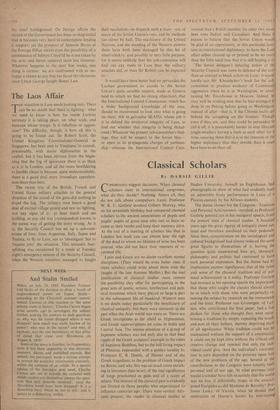The Laos Affair
m HE situation in Laos needs looking into. There I can be no doubt that there is fighting: what we need to know is how far inside Laotian territory it is taking place, on what scale, and between whose troops. is it rebellion or aggres- sion? The difficulty, though, is how all this is going to be found out. Sir Robert Scott. the United Kingdom Commissioner-General in Singapore, has been sent to Vientiane, to consult, presumably, with senior diplomatists in the capital, but it has been obvious from the begin- ning that the fog of ignorance there is as thick as it is in London, and all the more bewildering to fumble about in because, quite understandably, there is a good deal more immediate apprehen- sion there than here.
The recent trip of the British, French and United States military attaches in the general direction of the sound of the guns did nothing to dispel the fog. The military men heard a good deal of excited village gossip and saw no fighting, nor any signs of it : to hear much and see nothing, as any old war correspondent knows, is the surest way of getting the story wrong. As it is, the Security Council has set up a sub-com- mittee of four, from Argentina, Italy, Japan and Tunisia, to fly to Laos, not to 'investigate' but to 'inquire into' the situation. This semantic hair- splitting was occasioned by a tussle at Tuesday night's emergency session of the Security Council, when the Western members managed to finagle their resolution—to dispatch such a team--out of reach of the Soviet Union's veto, and by methods too clever by half. The machinery of the United Nations, and the standing of the Western powers there have both been damaged by this bit of smart-aleckry, and possibly to very little purpose, for it seems unlikely that the sub-committee will find out any more in Laos than the military attaches did, or than Sir Robert can be expected to.
It would have been better had we persuaded the Laotian government to accede to the Soviet Union's quite sensible request, made at Geneva (and to which we had no strong objection), that the International Control Commission, which has a wider background knowledge of the area, should be reconvened to look into what is going on there. (Or to galvanise SEATO, whose job it is to defend the territorial integrity of Laos, to find out whether that integrity is being threat- ened.) Whatever the present sub-committee's find- ings, they will be suspect to the Soviet bloc— or open to its propaganda charges of partisan- ship—whereas the International Control Corn-
mission had a Polish member (its other two met bers were Indian and Canadian). And there reason to believe that the Soviet Union woul be glad of an opportunity, at this particular junc ture in international diplomacy, to have the Laos affair either cleared up or proved to be no more than the little local fuss that it is still hoping it is The Soviet delegate's delaying action at the Security Council was more in defence of the veto' than an attempt to block action on Laos: it would. hardly suit Mr. Khrushchev's book for the- sulr, committee to produce evidence of Communist aggression when he is in Washington, or enter: taining Mr. Eisenhower in Moscow. Indeed, het may well be wishing now that he had arranged 101 drop in on Peking before- going to Washington• instead of after—that is, if the Chinese really are behind the scrapping on the frontier. Though even if they are, and they could be persuaded to call it off, it is presumably harder to stop illiterate jungle-dwellers haying a bash at each other for a time, assuring them that it is in the interests of the higher diplomacy that they should, than it must have been to set them off.


































 Previous page
Previous page